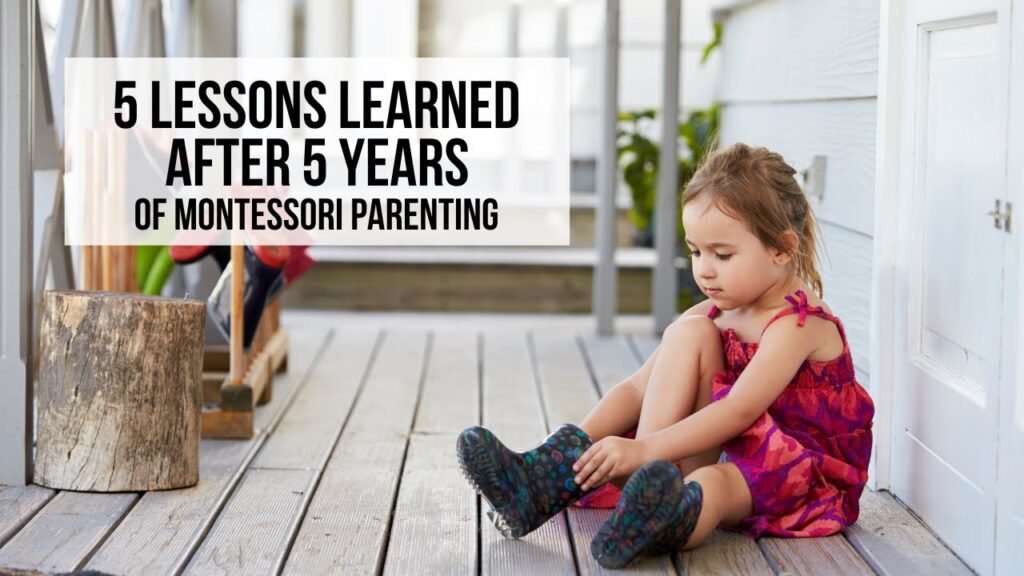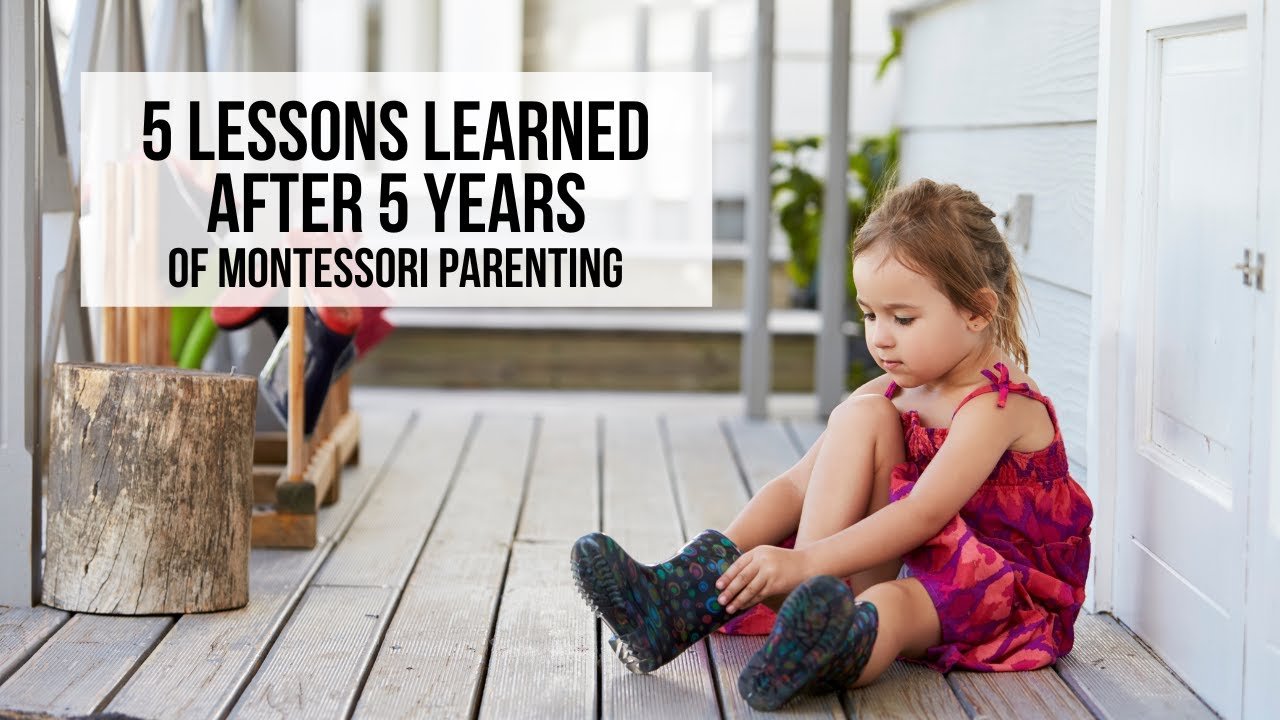Hey there! Welcome back! In today’s video, titled “5 Lessons Learned After 5 Years of Montessori Parenting: Practical Life, DIY Toys, and More,” Ashley from Hapa Family shares her experiences and insights gained from practicing Montessori parenting for five years. She covers a range of topics, including the importance of practical life activities and DIY Montessori toys, as well as the benefits of shopping secondhand. Ashley also provides links to her shop, recommended reading materials, as well as her audio and video gear. Throughout the video, she emphasizes that perfection is not necessary in Montessori parenting and encourages finding joy in imperfections. So, if you’re a parent of young children or interested in Montessori principles, you’ll definitely want to check out this informative video!
Ashley, a mom of two young girls, Kylie and Mia, has been using Montessori principles with her children since infancy. She shares an exciting announcement about a new pre-recorded class available on her teachable platform, which focuses on navigating sibling struggles. In this video, Ashley discusses the five lessons she’s learned throughout her Montessori parenting journey. Lesson one emphasizes the core of Montessori parenting at home- practical life activities and chores. Lesson two reminds parents that children have different interests and may not be into certain toys or activities, and that’s perfectly fine. She goes on to discuss the importance of borrowing, DIY, or buying secondhand Montessori materials. Ashley encourages parents to focus on their unique child, instead of worrying about what other children are doing. Lastly, she highlights the benefits of spending quality time outdoors with children. These lessons, along with a bonus tip, provide valuable insights for anyone interested in incorporating Montessori principles into their parenting journey.

Lesson 1: Practical Life is the Core of Montessori Parenting
Introduction to practical life activities
Practical life activities are an essential component of Montessori parenting at home. These activities involve daily tasks and chores that children observe in their everyday lives, such as cooking, cleaning, gardening, and self-care routines. By incorporating practical life activities into their daily routines, children not only develop practical skills but also enhance their independence, concentration, coordination, and a sense of responsibility.
Benefits of practical life activities
Engaging children in practical life activities offers numerous benefits. Firstly, it allows them to develop independence and self-confidence as they learn and master important skills needed for their everyday lives. By actively participating in activities such as pouring, sweeping, and folding clothes, children gain a sense of accomplishment and grow in their abilities.
Practical life activities also promote the development of fine and gross motor skills. Through activities like buttoning clothes or using kitchen utensils, children refine their hand-eye coordination and strengthen their fingers and hand muscles.
Furthermore, practical life activities foster concentration and attention to detail. As children engage in activities that require focus and precision, they develop their ability to concentrate for extended periods, an essential skill for future academic endeavors.
Additionally, practical life activities nurture a sense of order and organization in children. By participating in tasks such as setting the table or organizing their belongings, children learn the importance of maintaining an orderly environment, which can contribute to their overall wellbeing and sense of control.
Examples of practical life activities
There are numerous practical life activities that parents can introduce to their children at home. Some examples include:
-
Pouring activities: Children can practice pouring water from one container to another, which not only develops their motor skills but also teaches them concepts of volume and control.
-
Sweeping and mopping: Children can learn to sweep the floor or mop spills, allowing them to contribute to the cleanliness of their environment while enhancing their coordination and responsibility.
-
Dressing and self-care routines: Encouraging children to dress themselves, brush their teeth, or tie their shoelaces promotes independence and self-care skills.
-
Food preparation: Children can participate in food preparation activities like slicing fruits or vegetables, allowing them to develop food preparation skills, coordination, and an appreciation for healthy eating.
Integrating practical life activities into daily routines empowers children to become active participants in their homes and communities, and lays a strong foundation for their future development and success.
Lesson 2: Embrace Your Child’s Individual Interests
Understanding that children have different interests
It is important to recognize and accept that every child is unique, with their own set of interests and preferences. While Montessori promotes a holistic approach to education and development, it does not imply that every child will have the same interests or be equally inclined towards particular toys or activities.
Allowing children to explore and choose their own toys and activities
As parents, it is crucial to provide opportunities for children to explore and choose their own toys and activities based on their individual interests. By offering a variety of open-ended toys and materials, parents can encourage their children to follow their curiosity and engage in activities that genuinely captivate their attention.
Creating a supportive environment for your child’s interests
Creating a supportive environment for your child’s interests entails offering resources, materials, and experiences that cater to their unique passions. By providing access to books, tools, and activities related to their interests, parents can foster a love for learning and encourage their child’s growth in specific areas. Additionally, it is essential to celebrate and show genuine interest in your child’s pursuits, reinforcing their sense of self and fostering a positive relationship between parent and child.
Lesson 3: Borrow, DIY, and Buy Secondhand Montessori Materials
The importance of Montessori materials
Montessori materials are specifically designed to aid in a child’s development and support their natural learning process. These materials are carefully curated to promote sensory exploration, fine motor skills, problem-solving, and abstract thinking. While Montessori materials play a significant role in a child’s educational journey, investing in a wide range of expensive materials may not always be practical or necessary.
Ways to acquire Montessori materials
Instead of buying brand new Montessori materials, parents can consider other alternatives such as borrowing, do-it-yourself (DIY), or buying secondhand. Borrowing materials from friends, family, or local Montessori communities allows children to explore different materials without the financial commitment.
Engaging in DIY projects is another great way to incorporate Montessori materials into your child’s environment. Many Montessori materials can be created using household items or easily sourced materials, making it a cost-effective and creative option. DIY projects also allow for customization based on your child’s specific needs and interests.
Buying secondhand Montessori materials is an environmentally friendly and cost-effective approach. Many Montessori materials are made to last and can be found in great condition through thrift stores, online marketplaces, or Montessori-specific buy and sell groups. By purchasing secondhand, parents can reduce waste and save money while still providing valuable learning resources for their child.
Benefits of borrowing, DIY, and buying secondhand
Utilizing these alternative methods to acquire Montessori materials offers several advantages. Borrowing materials allows children access to a variety of resources, fostering exploration and exposure to new concepts. DIY projects promote creativity and resourcefulness while providing a personalized touch to the learning materials. Finally, buying secondhand materials is not only cost-effective but also promotes sustainability and reduces waste, aligning with the values of Montessori education.
Lesson 4: Focus on Your Unique Child
Avoiding comparison with other children
One of the most important lessons in Montessori parenting is to avoid comparing your child to others. Each child is unique and develops at their own pace. Comparisons can be detrimental to a child’s self-esteem and hinder their natural progress. Instead of focusing on other children’s achievements or milestones, celebrate your child’s individual progress and growth.
Understanding and embracing your child’s individual strengths and weaknesses
Recognizing and embracing your child’s individual strengths and weaknesses is crucial for their overall development. While Montessori principles provide a framework for learning and growth, it is important to tailor those principles to your child’s specific needs and abilities. By observing and understanding your child’s unique attributes, you can provide the appropriate support and resources to nurture their strengths and address their weaknesses.
Tailoring Montessori principles to your child’s needs
Adapting Montessori principles to suit your child’s needs involves personalizing their learning environment, materials, and activities. By observing your child’s interests and abilities, you can create a tailored learning plan that aligns with their individual strengths and promotes their overall development. This flexibility allows for a more holistic approach to education, ensuring that your child’s needs are met while fostering their love for learning.
Lesson 5: The Benefits of Spending Time Outdoors
Cognitive benefits of outdoor play
Spending time outdoors provides numerous cognitive benefits for children. Nature stimulates children’s curiosity, encouraging exploration and a hands-on learning experience. Outdoor play promotes problem-solving skills as children encounter new challenges, such as building structures, navigating uneven terrain, or identifying different plants and animals. Additionally, being surrounded by nature enhances concentration and attention span, allowing children to engage in imaginative play and self-directed activities.
Sensorial benefits of nature
Nature offers rich sensory experiences that support children’s sensory development. Outdoor environments provide an array of sights, sounds, smells, textures, and tastes, stimulating children’s senses and promoting their sensory integration skills. By engaging in outdoor play, children develop their senses, learn to appreciate nature’s beauty, and strengthen their connection with the natural world.
Social-emotional benefits of outdoor activities
Spending time outdoors fosters social-emotional development in children. Outdoor play encourages collaboration, cooperation, and communication as children engage in group activities and explore nature together. Nature’s calming and soothing effects also promote emotional well-being and reduce stress and anxiety. Outdoor play provides opportunities for independence, decision-making, and risk-taking, building children’s confidence, resilience, and self-esteem.
Bonus Tip: Embrace Imperfections and Find Joy
Understanding that perfection is not necessary
In Montessori parenting, it is essential to let go of the pursuit of perfection. Parents often feel pressured to meet high standards and achieve flawless execution of Montessori principles. However, it is crucial to understand that parenting is a learning journey filled with imperfections. Embracing imperfections and accepting that mistakes are part of the process allows parents to focus on progress, growth, and the genuine joy of parenthood.
Finding joy in the Montessori parenting journey
Montessori parenting is an extraordinary adventure filled with joy and discovery. Finding joy in the small, everyday moments is crucial for both parents and children. By focusing on the process rather than the outcome, parents can appreciate their child’s growth, curiosity, and sense of wonder. Celebrating achievements, big and small, creates a positive and joyful environment that nurtures a child’s love for learning and exploration.
Striving for improvement while embracing imperfections
While embracing imperfections is important, it is also beneficial to strive for improvement as parents. The Montessori journey is a continuous process of learning, growing, and adapting. Seeking knowledge, attending workshops, and connecting with other Montessori parents can provide valuable insights and inspiration. By combining a desire for improvement with an acceptance of imperfections, parents can create a harmonious balance that supports their child’s development and their own growth as parents.
Conclusion
Montessori parenting offers valuable principles that can guide parents in supporting their child’s growth and development. By emphasizing practical life activities, embracing a child’s individual interests, utilizing alternative methods for acquiring materials, focusing on the unique qualities of each child, spending time outdoors, and embracing imperfections, parents can create an enriching and nurturing environment for their children. Montessori parenting is both a rewarding and ongoing journey, filled with love, joy, and the endless possibilities of learning and growth.

